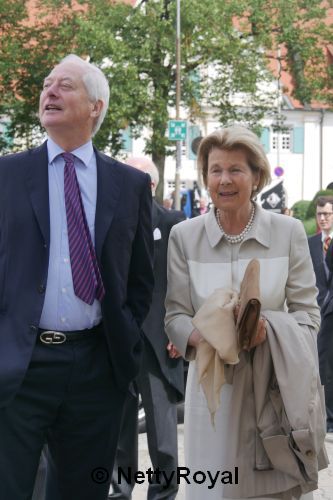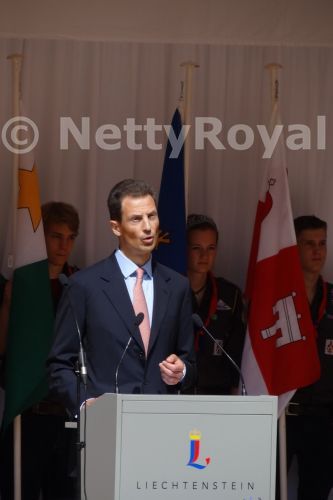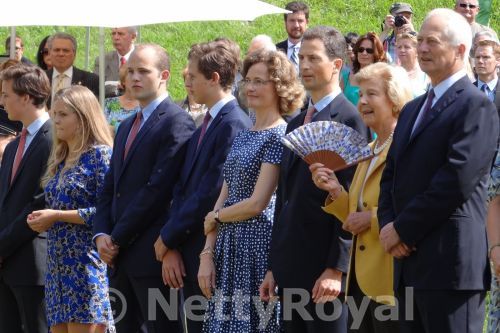Last modified: 14 January 2024
The country
The state is known as Fürstentum Liechtenstein in its national language. This means the Principality of Liechtenstein.
The Princes of Liechtenstein perhaps descend from the Donauwörth family, landlords of Bavaria, who probably lived in Lower Austria in the 13th century. The name comes from the Liechtenstein castle in Mödling, southern from Vienna. The family is one of the oldest noble families in Austria. The first known ancestor of the house of Liechtenstein was Hugo of Liechtenstein, mentioned around 1140. His descendants obtained lots of land in the Habsburg Empire. In 1608 they became Princes of the Holy Roman Empire, Duke of Troppau in 1613, and Prince and Duke of Jägerndorf in 1623. In 1699 Prince Johann Adam, bought Schellenberg and in 1712 the county of Vaduz. Prince Joseph Wenzel exchanged the property for other property with his uncle Anton Florian, who had been the teacher of the later Emperor Karl VI. On January 23rd, 1719, after uniting Schellenberg and Vaduz, the Emperor created the Principality of Liechtenstein , named after its reigning family, which is unique. It is the only state of the Holy Roman Empire in the German branche that still exists. For a long time the Princes reigned the country from their houses in Vienna.
Liechtenstein became fully independent during the French occupation, after becoming a member of the Rhine Alliance in 1806. The first Prince who visited Liechtenstein was Alois II in 1842. The first constitution and the government were given in 1862 by Prince Johann II (who reigned from 1858 to 1929!), who visited his country from time to time and was very interested in the welfare of it. Prince Franz Joseph II, son of Prince Alois of Liechtenstein and Archduchess Elisabeth of Austria, was the first Prince who actually lived in Liechtenstein at Vaduz Castle. Under his reign the country became a modern state. He was able to keep the country neutral in World War II. In 1989 (in 1984 as a regent) he was followed by his son Hans Adam II.



Sovereign
The current sovereign is Johannes Adam (Hans Adam) II Ferdinand Alois Josef Maria Marko d’Aviano Pius Fürst (Prince) von und zu Liechtenstein. He was born at Zürich, Switzerland, on 14 February 1945.
He is the son of Fürst Franz Josef II von und zu Liechtenstein (1806-1989) and his wife Countess Gina Wilczek (1921-1989).
Enthronement
Hans Adam became a regent for his father in 1984, and succeeded him after his death on 13 November 1989. On 15 August 2004 he handed over the daily governmental power to his son Hereditary Prince Alois. He however remains the head of state of Liechtenstein.
The inauguration took place in the castle grounds of Vaduz Castle, Liechtenstein, on 15 August 1990.
Other details
The Prince is a Roman Catholic.
Marriage and descendants
Prince Hans Adam II was married to Countess Marie Kinsky von Wchinitz und Tettau (1940-2021) since 1967.
Their children:
- Hereditary Prince Alois (born 1967)
- Prince Maximilian (born 1969) is married to Angela Brown (born 1958) since 2000. They have one son, Prince Alfons (born 2001).
- Prince Constantin (1972-2023) is married to Countess Marie Kalnóky (born 1975) since 1999. They have two sons, Prince Moritz (born 2003) and Prince Benedikt (born 2008), and one daughter, Princess Georgina (born 2005).
- Princess Tatjana (born 1973) is married to Philipp von Lattorff (born 1968) since 1999. They have two sons, Lukas von Lattorff (born 2000) and Maximilian von Lattorff (born 2011), and five daughters, Elisabeth von Lattorff (born 2002), Marie von Lattorff (born 2004), Camilla von Lattorff (born 2005), Anna von Lattorff (born 2007) and Sophie von Lattorff (born 2009).
Heir to the throne
Hereditary Prince Alois Philipp Maria was born at Zürich, Switzerland, on 11 June 1968.
Alois hs been the permanent representative for exercising the sovereign powers due to him since 15 August 2004, in preparation for his succession to the throne. Since he has been performing both nationally and internationally the duties of Head of State of the Principality of Liechtenstein.
He is married to Duchess Sophie in Bavaria (born 1967) since 1993.
Their children:
- Prince Joseph Wenzel (born 1995)
- Princess Marie Caroline (born 1996)
- Prince Georg Antonius (born 1999)
- Prince Nikolaus (born 2000)
Postal address
Vaduz Castle
9490 Vaduz
Principality of Liechtenstein
Succession
The first-born male of the eldest line is always called to succeed to the throne. The age of a dynastic line shall be calculated by reference to descent from Prince Johann I of Liechtenstein (1760-1836). The person succeeding to the throne as Reigning Prince in accordance with the order of succession unites in his person the functions of Head of State, Ruler of the Princely House and Chairman of the princely foundations. Where the Reigning Prince abdicates, he must do so by express written declaration given to the Hereditary Prince or successor to the throne, to the Family Council and to the Head of Government. Abdication is irrevocable and must be published in the Official Gazette. If, as a result of serious physical or mental illness, the Reigning Prince becomes permanently incapable of exercising the powers and duties assigned to him by this Constitution to promote the reputation, esteem or welfare of the Princely House or of the Principality of Liechtenstein, the Family Council shall, after careful clarification of the facts, call on the Reigning Prince to abdicate. If the Reigning Prince is unable or unwilling to accede to this request within an appropriate period of time or if the attempt to make contact with the Reigning Prince appears from the outset to have no prospect of success, the Family Council shall institute the procedure to relieve him of office or the procedure to have him declared incapable. Afterwards his rights and duties shall be exercised by a regent until his successor accedes to the throne. A regent cannot be appointed as guardian or legal representative of a Reigning Prince who is a minor or of an Hereditary Prince who is a minor.
The Reigning Prince and all descendants in the male line of Prince Johann I of Liechtenstein (1760-1836), being issue of a recognized marriage, are members of the princely family by birth. A princess whose membership is by birth does not lose such membership on her marriage. Nonetheless children born of such a marriage do not acquire membership by birth. The consort of the Reigning Prince and the wives of princes are members by marriage, provided the marriage is recognized in accordance with this dynastic statute. Membership acquired through marriage is retained during widowhood. It comes to an end where such widow remarries, unless the Reigning Prince provides otherwise on her request. The same applies on the dissolution of the marriage bond, from the date on which the relevant decision takes effect. Where a member of the Princely House has the intention to marry, he must inform the Reigning Prince thereof and deposit with the secretariat of the Reigning Prince all documents required under Liechtenstein law, together with a written and unconditional declaration by the other party to the intended marriage that that party recognizes the binding nature of all aspects of this Constitution, for that party and all issue arising from the intended marriage. The secretariat shall examine the documents. If they are complete and the Reigning Prince considers that all conditions for approval of the intended marriage are met, he shall declare that he consents thereto. The Reigning Prince shall then notify all members of the Princely House who are of full age thereof, at their last-known address. Within one month of notification of the Reigning Prince’s consent, any member of the Princely House who is of full age may object to the intended marriage in writing. The wedding shall take place in public in the presence of the Reigning Prince, who may send a representative in his place, and of two witnesses of full age.
Membership of the Princely House of Liechtenstein is based on free will. Where membership is by birth, free will is presumed unless and until membership is renounced after attainment of full age by express, written declaration notified to the Reigning Prince and the Family Council. Such declaration is irrevocable and is valid only for the person making it. All princes shall be entitled, on attaining their majority, to renounce their right to succeed to the throne by express written declaration given to the Reigning Prince and to the Family Council. Such renunciation is irrevocable and applies only to the person making it. It does not affect the succession to the throne of the other members of the Princely House. All members of the Princely House are Liechtenstein citizens. The Reigning Prince and the next descendant in the male line entitled to succeed to the throne may not acquire foreign citizenship. In addition, any member succeeding to the throne must renounce any foreign citizenship acquired previously. Other members may renounce Liechtenstein citizenship with or without the acquisition of foreign citizenship only if there are substantial reasons for doing so.
Adoption can in no case give rise to membership of the Princely House. Only in the case where the male line of the Princely House is to die out may the last Reigning Prince adopt an Hereditary Prince. Where a member of the Princely House nonetheless wishes to adopt a person outside the family, he must inform the Reigning Prince thereof. Adoption within the family shall not change the order of succession to the throne. If a member of the Princely House is adopted by a person outside the family, the member and where the member is under age the guardian must seek the approval of the Reigning Prince and state the reasons . The Reigning Prince shall decide whether or not the member of the family is to remain part of the Princely House. In the case of issue born to a princess out of wedlock, the Reigning Prince shall decide on their name and, where appropriate, their title and coat of arms. Where a child born out of wedlock to a prince is rendered legitimate by a subsequent marriage, the Reigning Prince shall decide whether or not such legitimized child belongs to the Princely House.
Titles
The sovereign is His Serene Highness, Reigning Prince von und zu Liechtenstein, Duke of Troppau and Jägerndorf, Count (of) Rietberg, Sovereign of the House of Liechtenstein. His consort is Her Serene Highness, Princess von und Liechtenstein, Duchess of Troppau and Jägerndorf, Countess (of) Rietberg. She shall retain this title during her widowhood. The heir to the throne bears the title His Serene Highness, Hereditary Prince von und zu Liechtenstein, Count (of) Rietberg. All other members of the dynasty are His/Her Serene Highness, Prince(ss) von und zu Liechtenstein, Count(ess) of Rietberg.
Royal residences
The princely family of Liechtenstein since 1938 officially resides at Vaduz Castle in Vaduz, Liechtenstein. The real estate administration manages the real estates of the Stiftung Fürst Liechtenstein in Vienna, Austria. These include the “Stadtpalais”, the “Gartenpalais”, the “Alserbachpalais” and the “Savoysche Damenstift”. The family posses several other castles in Austria, like the Riegersburg, Wilfersdorf Castle and Rosegg Castle. Most of the residences are private property, so before going check if they are open at all. Vaduz Castle is not open to the public, but on national day, 15 August, the palace grounds are open. The Garden Palais at Vienna is nowadays the Liechtenstein Museum and houses the royal art collections.
The Princes of Liechtenstein
| Johann Adam I (1656?-1712) | 1699/1712-1712 |
| Josef Wenzel (1696-1772) | 1718; 1748-1772 |
| Anton Florian (1656-1721) | 1718-1721 |
| Josef Johann (1690-1732) | 1721-1732 |
| Johann Nepomuk Karl (1724-1748) | 1732-1748 |
| Franz Josef I (1726-1781) | 1772-1781 |
| Alois I Josef (1759-1805) | 1781-1805 |
| Johann I (1760-1836) | 1805-1836 |
| Alois II (1796-1858) | 1836-1858 |
| Johannes II (1840-1929) | 1858-1929 |
| Franz I (1853-1938) | 1929-1938 |
| Franz Josef II (1906-1989) | 1938-1989 |
| Hans Adam II (1945- ) | 1989- |
Links
- Das Fürstenhaus von Liechtenstein
- Arabella Liechtenstein
- Felix Hohenau
- Stiftung Fürst Liechtenstein
- Palais Liechtenstein
- Hofkellerei des Fürsten von Liechtenstein
- Liechtenstein. The Princely Collections
- Erlebniswelt Burg Liechtenstein
- Die Riegersburg
- Prinz von und zu Liechtenstein’sche Forst- und Gutsverwaltung
- Schloss Tierpark Labyrinth Rosegg
- Liechtenstein Schloss Wilfersdorf
- Zámek Lednice
- Zámek Valtice
- LGT Bank Liechtenstein
- 300 Jahre Fürstentum Liechtenstein
- Liechtensteiner Staatsfeiertag
